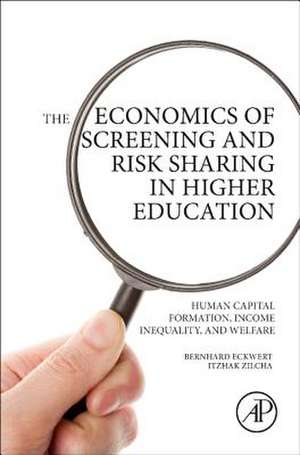The Economics of Screening and Risk Sharing in Higher Education: Human Capital Formation, Income Inequality, and Welfare
Autor Bernhard Eckwert, Itzhak Zilchaen Limba Engleză Paperback – 21 apr 2015
- Investigates conditions under which better screening leads to desirable outcomes such as higher human capital accumulation, less income inequality, and higher economic well-being.
- Questions how the role of screening relates to the funding structure for investments in higher education and to the availability of risk sharing arrangements for individual talent risks.
- Reveals government policies that are suited for controlling or counteracting detrimental side effects along the growth path.
Preț: 225.03 lei
Preț vechi: 272.13 lei
-17% Nou
Puncte Express: 338
Preț estimativ în valută:
43.06€ • 45.07$ • 35.84£
43.06€ • 45.07$ • 35.84£
Carte tipărită la comandă
Livrare economică 25 martie-08 aprilie
Preluare comenzi: 021 569.72.76
Specificații
ISBN-13: 9780128031902
ISBN-10: 0128031905
Pagini: 190
Ilustrații: black & white illustrations
Dimensiuni: 152 x 229 x 10 mm
Greutate: 0.26 kg
Editura: ELSEVIER SCIENCE
ISBN-10: 0128031905
Pagini: 190
Ilustrații: black & white illustrations
Dimensiuni: 152 x 229 x 10 mm
Greutate: 0.26 kg
Editura: ELSEVIER SCIENCE
Public țintă
Graduate students and researchers working in human capital, inequality, and economic growth, and more generally in macroeconomics, public economics, and labor economics.Cuprins
1 Uncertainty and Screening: Preliminary Notions 2 Screening Information in Equilibrium 3 Screening and Economic Growth 4 Higher Education Financing 5 The Role of Government in Financing Higher Education 6 Screening and Income Inequality
Recenzii
"...the relevance of the book’s theme and the clear presentation makes this work a highly valuable reading for all scholars of the economics of education." --Journal of Economics
"Recent economic conditions and predictions have increased interest in the analysis of higher education finance, provision, and allocation. This timely book presents a rigorous theoretical analysis tackling two key issues, and is a valuable resource for both experienced and aspiring researchers." –Sinan Sarpça, Koç University
"This book offers a unique comprehensive analysis of the use of screening techniques for admission to higher education. It develops rigorous theoretical insights to address a highly relevant issue in policy which carries huge potential implications for human capital accumulation, the allocation of talents, and income inequality." – Graziella Bertocchi, Università di Modena e Reggio Emilia
"This is a beautiful work, a pleasure to read. With MOOCs, reduced government support, and worsening income distribution, concern about how students are sorted among institutions of higher education is rising. To address the effect of universities' ability to process more information about students, Eckwert and Zilcha devise a general equilibrium sorting model , more technically sophisticated than the usual partial equilibrium approach but also more relevant for policy. There are analogies between what they do for higher education and what others have done to model health insurance, where welfare can also be reduced by improved information." – David Denslow, University of Florida
"Reading this book will be a pleasure for everyone who is interested in education and in the same time familiar with the economics of information and general equilibrium theory. The models are designed parsimoniously, but rich enough to make the point, and the exposition is perfectly rigorous and clear. In most cases, the authors also give a crisp intuition for the effects driving the results…the book contains important lessons for empirical research and policy. Its findings actually underline the value of general equilibrium theory for education economics by pointing out trade-offs and market repercussions which are seldom appreciated…the relevance of the book’s theme and the clear presentation makes this work a highly valuable reading for all scholars of the economics of education." – The Journal of Economics
"Recent economic conditions and predictions have increased interest in the analysis of higher education finance, provision, and allocation. This timely book presents a rigorous theoretical analysis tackling two key issues, and is a valuable resource for both experienced and aspiring researchers." –Sinan Sarpça, Koç University
"This book offers a unique comprehensive analysis of the use of screening techniques for admission to higher education. It develops rigorous theoretical insights to address a highly relevant issue in policy which carries huge potential implications for human capital accumulation, the allocation of talents, and income inequality." – Graziella Bertocchi, Università di Modena e Reggio Emilia
"This is a beautiful work, a pleasure to read. With MOOCs, reduced government support, and worsening income distribution, concern about how students are sorted among institutions of higher education is rising. To address the effect of universities' ability to process more information about students, Eckwert and Zilcha devise a general equilibrium sorting model , more technically sophisticated than the usual partial equilibrium approach but also more relevant for policy. There are analogies between what they do for higher education and what others have done to model health insurance, where welfare can also be reduced by improved information." – David Denslow, University of Florida
"Reading this book will be a pleasure for everyone who is interested in education and in the same time familiar with the economics of information and general equilibrium theory. The models are designed parsimoniously, but rich enough to make the point, and the exposition is perfectly rigorous and clear. In most cases, the authors also give a crisp intuition for the effects driving the results…the book contains important lessons for empirical research and policy. Its findings actually underline the value of general equilibrium theory for education economics by pointing out trade-offs and market repercussions which are seldom appreciated…the relevance of the book’s theme and the clear presentation makes this work a highly valuable reading for all scholars of the economics of education." – The Journal of Economics

